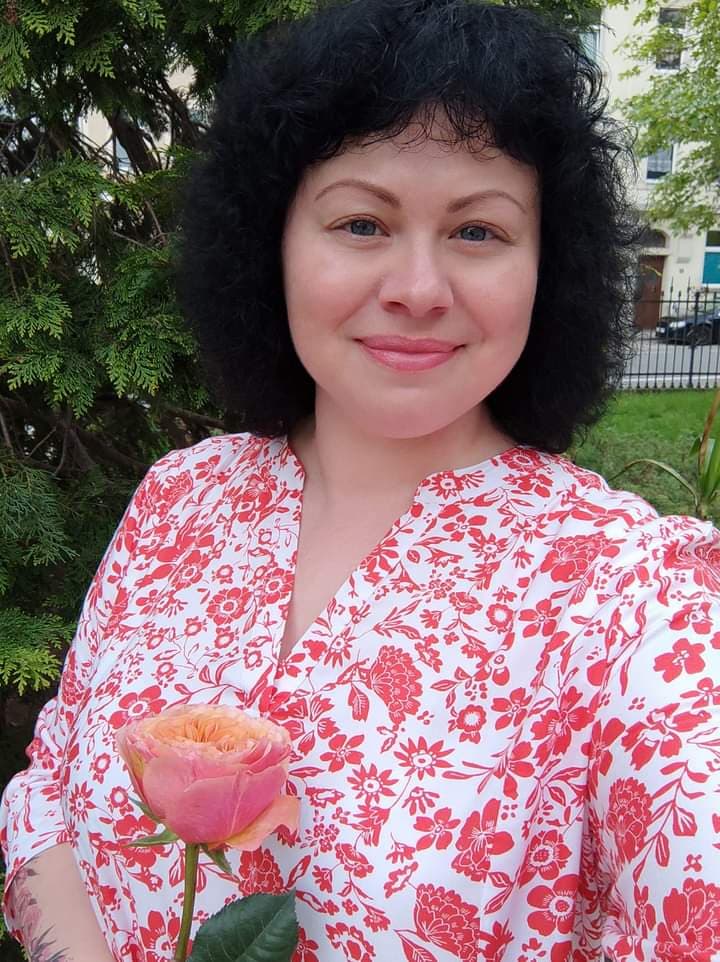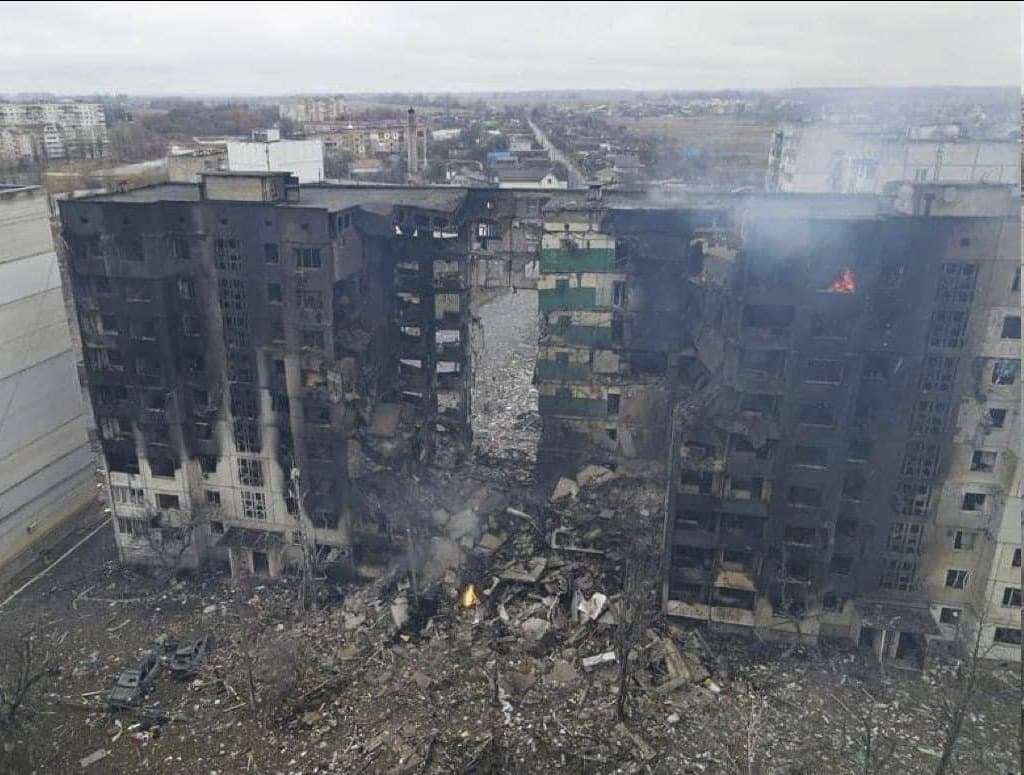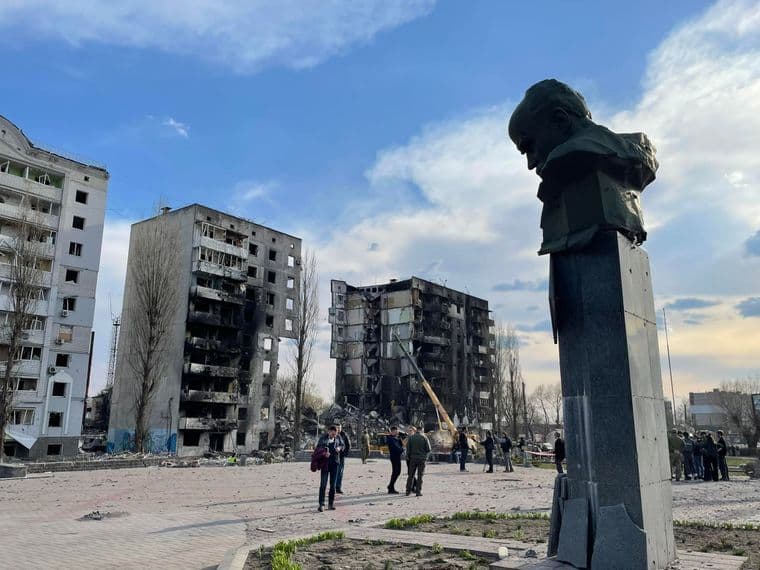This town, 50 kilometers northwest of Kyiv, will hold a special place in the Kremlin regime’s long list of crimes. Fierce fighting at the beginning of the Russian invasion caused far bigger destruction of homes than in other settlements of the Kyiv region that suffered from enemy shelling.
Now Borodyanka, like Bucha, Hostomel, and Irpin, are among the symbols of what will later be called Ukrainians’ resilience. How many times have the invaders tried to conquer, kill, or burn them, but they could not break this people.
People in Borodyanka prayed when they heard an airplane. Nine-story buildings collapsed next to them. Debris hid people who sought salvation in bomb shelters. But there was no choice: those who could not evacuate to other cities had to wait out in basements.
Maryna Kuraptseva is a media coach. In the past years, she lived with her family in Borodyanka, where she had moved from Yenakievo, Donetsk region in 2014. She says that Borodyanka was a town with a population of about 16,000. A peaceful, ordinary town with ordinary Ukrainian people who lived an ordinary life. And, of course, none of them expected what would happen on February 24.

“I woke up in the morning to go to work, made myself a coffee and turned on the phone. Then I saw that I had slept two hours since the beginning of the full-scale Russian invasion of Ukraine, that a lot of cities had already suffered devastating blows. I understood that it was real war. I don’t mean that before that the war in Donbas was not real. Soldiers died, cities were destroyed. But I didn’t believe that war would come to Borodyanka. According to my logic of a normal person, this is the rear, but I did not take Putin’s logic into account.
On that day, we didn’t manage to leave because there was a traffic jam on the highway. There were four lanes where there used to be two, cars rubbed one another’s doors and clambered highway barriers. We simply would not have had enough time, and what happened on the 25th would have happened anyway. Bridges would have been blown up. If I had known what would happen next, I would have walked to Makariv. But half of Makariv was burned later together with the people who had evacuated there.
In Borodyanka, my family and I settled “as best as possible”: a central street and windows opposite the military commissariat. I looked out the window to see what flag was hanging on the military commissariat, because I know how it is when you wake up, and instead of a blue and yellow flag you see a rag with a two-headed chicken or an incomprehensible three-letter tricolor “formation”.
I watched people taking everything out of their shops, watched a queue at the pharmacy. We all have some experience, but it hardly helps, because in emergency you need to be a specially trained person to make things work. It would be good if the state systematized this work, made it mandatory, from self-training to functioning bomb shelters, instead of long basements in schools with no support in the middle.
I went to the pharmacy and the store later. At the pharmacy, we bought the last medications and paid over a thousand hryvnias. There was not much, but we bought the most necessary things. In the evening we went shopping. All the basic food that we wanted to buy: salt, yeast, flour, sugar, oil had been sold out. We already know that bread disappears first. And so it happened – the next day there was no more bread.
In the evening, they wrote in the condominium chat that we must have blackouts, must cover our windows, because Hostomel was “in full swing” and there might be shelling. Then we heard the first reports about marks on houses – green circles with crosses.
I started packing, and I had such an internal protest, a crazy feeling of pain, emptiness. I felt as if my gut twisted. I look at the black bag that has been with me since 2015, I look at all this – and my heart breaks. I sat down on the couch and cried… over that bag. Tears rolled down on my luggage, I think I was all wet with those tears. I cried so much that I almost fainted. And all because I understood that I had been standing on the ruins of my normal, peaceful life for eight years, collecting those ruins for eight years – and now they are being taken away from me, too.
I didn’t want to live like that, I felt fatigued. For eight years, you strive for something, accomplish something, implement projects, participate in various events to be remembered – all in order to talk about the problems of Donbas, to reach a wider audience, to tell about us. And now I don’t know what will happen to us tomorrow. Not only this job but maybe also I and my family won’t exist tomorrow.
On the evening of February 25, when we already knew what was happening in Hostomel and had information about the shelled boarding school, I recorded a video message in Russian. A lot of people did it. We tried, naively, to get through to the Russians: maybe they will go to some rallies, like we did on the Maidan, record streams, show that they cared. We went on air even from bomb shelters. And I would have done it if I could. I had nothing to lose, and I knew my fate very well. If I ended up under occupation, it would mean dying in terrible torture, like women died in other towns. I still have the appeal on Facebook. Although I don’t like it a lot as it seems very pathetic now.
We turned off the light. Of course, no one could sleep. We saw a glow on the horizon. It was our last night at home. At 3 a.m., I made coffee, and then I hear a rumble and see our cars driving without headlights. And I realize: that’s it. That rumble cut off a part of my life.
I returned to my family. We talked for a long time. It was such anguish, such dread, I don’t know how to describe it, when your heart is pounding, and you can’t sleep because it beats into your bed.
The 26th of February came… Air raid alarms began. We carried things to the vestibule. It was not until later that I realized what an air raid alarm is, and that it makes no sense to go out. You can wait out Grad or tank shelling, but not aviation. Then a house in the Staryky area was hit – a family died there; it was the first death in Borodyanka. By the way, there was an old cemetery in that area – those bastards razed it to the ground, preparing a foothold for their tanks. Nothing sacred. An acquaintance from that area wrote to me that I had to go to the shelter.
We took our backpacks, blankets and left; the shelter was right in front of our house. On the way, we met territorial defence fighters, who told us that Russian tanks marked with the letter “V” were coming there. “Run,” they said. There were people with cameras near the bomb shelter; I scolded them, because they could have exposed the shelter, and then the Russians could have taken people as a human shield. We stayed in the bomb shelter until the next morning.
On February 27, the guys came and said that reinforcements had arrived, and they beat orcs heavily near Hostomel. We asked if we could go home to wash and change clothes – they allowed us to go. We left our things with our friends and left. At home, we put our clothes into the washing machine, but did not have time to wash them. I went to the shower – and then it started. It boomed and thundered with such force that our house shook while I was standing all wet and soaped up in the shower with my lenses on the shelf. So I finished quickly, packed yesterday’s borscht and pilaf into a large plastic container. Later, it came in handy. We went to the bomb shelter and did not leave until March 2.
The 27th of February was very scary. I was so afraid for my family: sister, mother, and father. What if they are hit? What if they get injured? What if you can’t help and a person bleeds to death? What if the building crushes us under the rubble?.. We were still in the shelter of the hospital – that was the first target for the ruscists. They deliberately shelled hospitals and shops. In our town, people took food out of burning supermarkets with their bare hands, then formed food packages, and distributed them: first – to children and elderly people, and only then – to men. I remember there was a guy who stayed with dignity. When I praised him, he cried on my shoulder, said that his whole family was in Chernihiv and he had no contact with them from the first day. Just pain…
On February 28, I woke up and remembered about my birthday. I remembered that there was a beautiful long silk dress waiting for me in the closet, which I would never wear. And I regretted it… More precisely, not the dress itself, but what it represented: I could wear it, put on nice shoes, celebrate, and dance. The people in the shelter wished me happy birthday… They gave me drinking water; a woman gave me an orange; the families with children – chocolates, cheese, sausage.
The next day, the most terrible began: there were fierce battles from the morning; the territorial defence beat them heavily. If the sky was closed, they would never have broken through, there would not have been those horrors in Bucha and Irpin. But there would have been planes instead. On March 1, a bomb fell and destroyed three huge high-rise buildings. I was constantly trying to explain to people how to act, how to hide; why they should be under the bench face down, and not run in panic and look for the “fifth corner”; how to protect the soft parts of the body and how snipers work in between bombings. I’m not an expert, I just remember 2014.

When everything started shaking and a cloud of dust rose up, people rushed to the exit. A pensioner, a woman with five children and an old woman were sitting nearby. There are such people in almost every community – active, distributed some flyers, friendly, sweet little old lady. I looked at them and realized: the crowd would trample them to death. I stood up and shouted: “Stop!!!!” And the crowd stopped. Like meerkats. White with terror. And the eyes… I later saw such eyes only in the rescuers who freed us. Faces as white as flour and white eyes… I hope to never see such a thing again. “Quiet, quiet,” I said. – Look at yourself, touch yourself. It’s just sounds. If it was something else, if it hit us, we would have already died. And outside is a sure death, we all have someone left outside.”
Little by little, everyone returned to their places. I couldn’t believe that I was shouting so much and my heart was beating so hard. Then people somehow started to listen to me. In that way, I took control of myself. I was very scared, but when someone cried, I went and hugged them, and it made me feel better.
And then there was the most terrible night in our lives. Now I look in the mirror and I see my gray temples; I turned gray overnight at the age of 38. We sat on the benches, clinging to each other, and waited. All around was burning, rumbling, and exploding. That was when our plastic container came in handy. We had to relieve ourselves somehow. How we looked for a place and used garbage bags was another story. We hid in nooks and crannies, and then took those bags out. It’s extremely embarrassing to say this, but I do. Because what the hell? Rusnia drove us into the basement, we didn’t have a normal toilet. It is incredibly humiliating when you lose your dignity because of the physical manifestations of your body. And rusnia made these physical, natural needs so disgusting that you hate yourself because you can’t wash or go to the toilet. They sit there in the Kremlin and send new and new planes. Meanwhile, there are two hundred people around – and my dad, mom, sister, and I take turns defecating in this container in complete darkness. May they sit like this all over Russia forever!
We heard an earful that night. Death rages around, and you must be silent.”

Later, Maryna’s family managed to evacuate, they were taken away by rescuers in the back of a truck. The girl says that she no longer hoped for rescue. It was a difficult and long way to the dreamed at least conditional security. Now she is in Germany, trying to adapt and put her life and the life of her family in order. In spite of all Maryna has been through, she assures that she does not lose the most valuable thing – hope.
Kateryna Horyachko
12.07.2022
The material is prepared within the project “Countering Disinformation in Southern and Eastern Ukraine” funded by the European Union.



